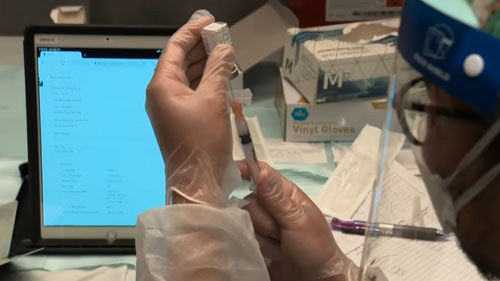| Recent Featured Videos and Articles | Eastern “Orthodoxy” Refuted | How To Avoid Sin | The Antichrist Identified! | What Fake Christians Get Wrong About Ephesians | Why So Many Can't Believe | “Magicians” Prove A Spiritual World Exists | Amazing Evidence For God | News Links |
| Vatican II “Catholic” Church Exposed | Steps To Convert | Outside The Church There Is No Salvation | E-Exchanges | The Holy Rosary | Padre Pio | Traditional Catholic Issues And Groups | Help Save Souls: Donate |  |









 " />
" /> " />
" /> " />
" /> " />
" /> " />
" />




The Theory of Baptism of Blood - A Tradition of Man
A small number of the fathers – approximately 8 out of a total of hundreds – are quoted in favor of what is called “baptism of blood,” the idea that a catechumen (that is, one preparing to receive Catholic Baptism) who shed his blood for Christ could be saved without having received Baptism. It is crucial to note at the beginning that none of the fathers considered anyone but a catechumen as a possible exception to receiving the Sacrament of Baptism; they would all condemn and reject as heretical and foreign to the teaching of Christ the modern heresy of “invincible ignorance” saving those who die as non-Catholics. So, out of the fathers, approximately 8 are quoted in favor of baptism of blood for catechumens. And, only 1 father out of hundreds, St. Augustine, can be quoted as clearly teaching what is today called “baptism of desire”: the idea that a catechumen could be saved by his explicit desire for water baptism. This means that with the exception of St. Augustine, all of the few fathers who believed in baptism of blood actually rejected the concept of baptism of desire. Take St. Cyril of Jerusalem, for example.
Here we see that St. Cyril of Jerusalem believed in baptism of blood, but rejected baptism of desire. St. Fulgence expressed the same.
Here we see that St. Fulgence believed in baptism of blood but rejected the idea of baptism of desire. And what’s ironic and particularly dishonest is that the baptism of desire apologists (such as the priests of the Society of St. Pius X) will quote these patristic texts (such as the two above) in books written to prove baptism of desire, without pointing out to their readers that these passages actually deny baptism of desire; for we can see that St. Fulgence, while expressing belief in baptism of blood, rejects baptism of desire, only allowing martyrs as a possible exception to receiving baptism. (What would St. Fulgence say about the modern version of the heresy of baptism of desire, also taught by such priests of the SSPX, SSPV, CMRI, etc. whereby Jews, Muslims, Hindus and pagans can be saved without Baptism?)
We can see that St. Fulgence would have – like all of the other fathers – sternly condemned the modern heretics who hold that those who die as non-Catholics can be saved.
But what is most interesting about this is that in the same document in which St. Fulgence expresses his error on baptism of blood (quoted already), he makes a different and significant error.
St. Fulgence says “Hold most firmly and never doubt” that infants who die without baptism are “to be punished in the everlasting torment of eternal fire.” This is wrong. Infants who die without baptism descend into Hell, but to a place in Hell where there is no fire (Pope Pius VI, Auctorem Fidei).[6] St. Fulgence shows, therefore, that his opinion in favor of baptism of blood is quite fallible by making a different error in the same document. It is quite remarkable, in fact, that in almost every instance when a father of the Church or someone else expresses his error on baptism of blood or baptism of desire that same person makes another significant error in the same work, as we will see.
It is also important to point out that some of the fathers use the term “baptism of blood” to describe the Catholic martyrdom of one already baptized, not as a possible replacement for water baptism. This is the only legitimate use of the term.
St. John is here describing the martyrdom of a priest St. Lucian, a person already baptized. He is not saying that martyrdom replaces baptism. St. John Damascene describes it the same way:
This is important because many dishonest scholars today (such as the priests of the Society of St. Pius X) will distort the teaching on this point; they will quote a passage on baptism of blood where St. John is simply speaking of baptism of blood as a Catholic martyrdom for one already baptized, and they will present it as if the person were teaching that martyrdom can replace baptism – when such is not stated anywhere.
Some may wonder why the term baptism of blood was used at all. I believe that the reason the term “baptism of blood” was used by some of the fathers was because Our Lord described His coming passion as a baptism in Mark 10:38-39.
We see in the aforementioned passage that Our Lord, although already baptized by St. John in the Jordan, refers to another baptism which He must receive. This is His martyrdom on the cross, not a substitute for baptism of water. It is His “second baptism,” if you will, not his first. Thus, baptism of blood is described by Our Lord in the same way as St. John Damascene, not to mean a substitute baptism for an unbaptized person, but rather a Catholic martyrdom which remits all the fault and punishment due to sin.
The term baptism is used in a variety of ways in the scriptures and by the Church fathers. The baptisms: of water, of blood, of the spirit, of Moses, and of fire are all terms that have been implemented by Church Fathers to characterize certain things, but not necessarily to describe that an unbaptized martyr can attain salvation. Read the verse of scripture in which the term baptism is used for the Old Testament forefathers:
I believe this explains why a number of fathers erred in believing that baptism of blood supplies the place of baptism of water. They recognized that Our Lord referred to His own martyrdom as a baptism, and they erroneously concluded that martyrdom for the true faith can serve as a substitute for being born again of water and the Holy Ghost. But the reality is that there are no exceptions to Our Lord’s words in John 3:5, as the infallible teaching of the Catholic Church confirms. Anyone of good will who is willing to shed his blood for the true faith will not be left without these saving waters. It is not our blood, but Christ’s blood on the Cross, communicated to us in the Sacrament of Baptism, which frees us from the state of sin and allows us entrance into the kingdom of Heaven (more on this later).
Endnotes:
[1] Jurgens, The Faith of the Early Fathers, Vol. 1: 811.
[2] Jurgens, The Faith of the Early Fathers, Vol. 3: 2269.
[3] Jurgens, The Faith of the Early Fathers, Vol. 3: 2251a.
[4] Jurgens, The Faith of the Early Fathers, Vol. 3: 2275.
[5] Jurgens, The Faith of the Early Fathers, Vol. 3: 2271.
[6] Denzinger 1526.
[7] Jurgens, The Faith of the Early Fathers, Vol. 2: 1139.
[8] Barlam and Josaphat, Woodward & Heineman, trans., pp. 169-171.
[9] Denzinger 714.
Sign up for our free e-mail list to see future vaticancatholic.com videos and articles.
Recent Content
^